清华大学外国哲学考博真题-参考书-分数线
清华大学外国哲学考博真题-参考书-分数线
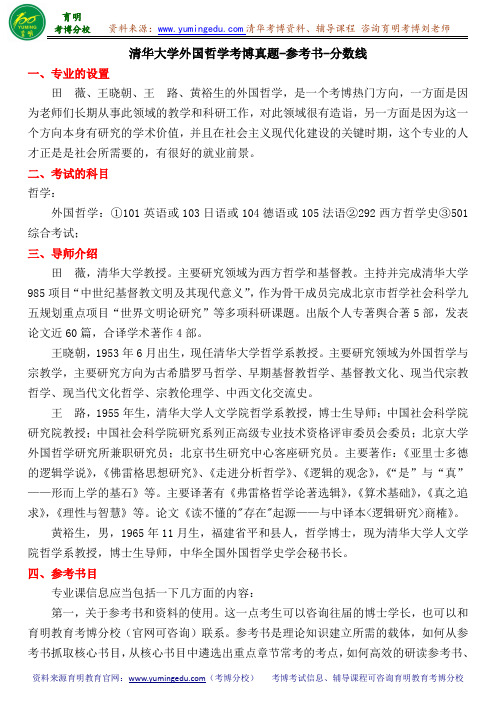
清华大学外国哲学考博真题-参考书-分数线一、专业的设置田薇、王晓朝、王路、黄裕生的外国哲学,是一个考博热门方向,一方面是因为老师们长期从事此领域的教学和科研工作,对此领域很有造诣,另一方面是因为这一个方向本身有研究的学术价值,并且在社会主义现代化建设的关键时期,这个专业的人才正是是社会所需要的,有很好的就业前景。
二、考试的科目哲学:外国哲学:①101英语或103日语或104德语或105法语②292西方哲学史③501综合考试;三、导师介绍田薇,清华大学教授。
主要研究领域为西方哲学和基督教。
主持并完成清华大学985项目“中世纪基督教文明及其现代意义”,作为骨干成员完成北京市哲学社会科学九五规划重点项目“世界文明论研究”等多项科研课题。
出版个人专著舆合著5部,发表论文近60篇,合译学术著作4部。
王晓朝,1953年6月出生,现任清华大学哲学系教授。
主要研究领域为外国哲学与宗教学,主要研究方向为古希腊罗马哲学、早期基督教哲学、基督教文化、现当代宗教哲学、现当代文化哲学、宗教伦理学、中西文化交流史。
王路,1955年生,清华大学人文学院哲学系教授,博士生导师;中国社会科学院研究院教授;中国社会科学院研究系列正高级专业技术资格评审委员会委员;北京大学外国哲学研究所兼职研究员;北京书生研究中心客座研究员。
主要著作:《亚里士多德的逻辑学说》,《佛雷格思想研究》、《走进分析哲学》、《逻辑的观念》,《“是”与“真”——形而上学的基石》等。
主要译著有《弗雷格哲学论著选辑》,《算术基础》,《真之追求》,《理性与智慧》等。
论文《读不懂的"存在"起源——与中译本<逻辑研究>商榷》。
黄裕生,男,1965年11月生,福建省平和县人,哲学博士,现为清华大学人文学院哲学系教授,博士生导师,中华全国外国哲学史学会秘书长。
四、参考书目专业课信息应当包括一下几方面的内容:第一,关于参考书和资料的使用。
这一点考生可以咨询往届的博士学长,也可以和育明教育考博分校(官网可咨询)联系。
清华大学857综合考试考研参考书目、考研真题、复试分数线

杨宝峰
《中国古代音乐史》 人民音乐出版社
杨荫浏著
630 中西音乐史 《中国近现代音乐史》高等教育出版社
汪毓和编著
《西方音乐通史》 上海音乐出版社
于润洋主编
专注清华大学考研辅导
《西方现代艺术史》 天津人民美术出版社 801 中西方美术史
H-阿拉森著,邹德侬等 译
《中国美术史》
胡显章、曾国屏主编; 李正风主持修订
《政治科学》
华夏出版社
迈克尔·罗斯金等
609 政治学概论 《比较政治制度》 高等教育出版社
曹沛霖等
《国际关系分析》 北京大学出版社
阎学通
《社会学(第 10 版)》中国人民大学出版社 1999 年版
波普诺
610 社会学理论
《社会学理论的结构》 华夏出版社 2001 年版
刘密新等
《高分子化学》(第四 化工出版社
版)
潘祖仁主编
《高分子物理》(第三 复旦大学出版社
版)
何曼君等
606 生物学
《基础生命科学》 高等教育出版社 第二版
吴庆余
607 西方哲学史 《西方哲学简史》 北京大学出版社 2002
赵敦华
《科学技术概论 》(第
608 科学技术概论
高等教育出版社 2006
二版)
604 普通物理
《大学物理》(第二版) 清华大学出版社
第一册至四册
605 综合化学
《无机化学》(上下册) 高等教育出版社,2004
专注清华大学考研辅导
作者
王向荣
[英]杰弗瑞·杰里柯//苏 珊杰·里柯 译者:刘滨 谊
周维权
董鉴泓,主编 沈玉麟,编 刘敦祯 潘谷西 陈志华 罗小未 高等艺术院校《艺术概 论》出版组 王朝闻主编 董鉴泓,主编 沈玉麟,编
博士、研究生入学考试西哲试题

博士、研究生入学考试西哲试题一、简答下列各题(每题5分,共50分)1、爱利亚学校2、柏拉图“回忆说的主要内容3、德漠克利特的“影像”说4、亚里士多德关于“第一哲学”的定义5、“奥卡姆剃刀”6、休漠的不可知论观点7、笛卡儿的二元论8、卢梭关于人类不平等的论述9、康德的“自在之物”(“物自体”)10、费尔巴哈论“思维与存在的统一”二、回答下列各题(每题10分,共30分)1、洛克对“天赋观念论”的批判2、简评实用主义真理观3、海德格尔论“此在”三、试论述黑格尔对康德哲学的批判与继承(20分)一.简答题(解释下列概念与名词,每题5分,共50分)1.存在者(巴门尼德)2.数是万物的本源;3.知识与意见(柏拉图);4.唯名论;5.有学问的无知(库萨的尼古拉)6.自因;7.《社会契约论》(卢梭);8.观念的关系和事实(休谟);9《人类理智新论》;10.“自我”“非我”二.分析题(全面的分析下列问题;每题25分,共100分)1.试论述亚里士多德实体学说的主要内容;2.试分析笛卡尔关于上帝存在的思路;3.试分析休谟因果学说和唯理论因果学说之间的区别;4.在康德哲学里,时间和空间具有哪些主要特征。
【名解1】水是万物的本原(南开00);奴隶道德和主人道德(复旦96);理念(人大98);理念论(人大97、浙是、大98);原子与虚空(人大97、吉大00、厦大99);逻各斯(赫拉克利特)(吉大00、浙大99);米利都学派(武大00);人是万物的尺度;努斯(人大97、浙大99);飞矢不动(南开00);实体(亚里士多德)(吉大00);人不能两次踏进同一条河流(人大00、北师大01、浙大98);一切都是由必然性而产生(德谟克利特);四因说(武大00、浙大98、人大01);回忆说(人大99、北师大01);潜能与现实(人大99);助产术(人大00);伊壁鸠鲁的快乐主义(厦大01);奥古斯丁(浙大98);原子论(浙大98);影像说(浙大98);四根说(浙大98);美德乃是一种和谐(毕达哥拉斯派)(浙大98);普纽玛(浙大99);《准则学》(浙大00);存在(巴门尼德)(浙大00);形式与质料(人大98);教父哲学(人大01);美德即知识(浙大00);人本主义(武大00)【简答1】简述柏拉图在《理想国》中阐述的伦理的政治思想。
清华大学人文学院考博真题-参考书-分数线-复习方法-育明考博
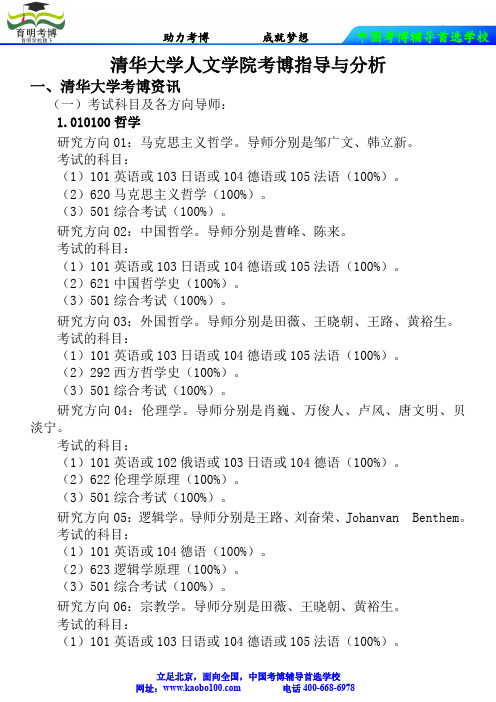
清华大学人文学院考博指导与分析一、清华大学考博资讯(一)考试科目及各方向导师:1.010100哲学研究方向01:马克思主义哲学。
导师分别是邹广文、韩立新。
考试的科目:(1)101英语或103日语或104德语或105法语(100%)。
(2)620马克思主义哲学(100%)。
(3)501综合考试(100%)。
研究方向02:中国哲学。
导师分别是曹峰、陈来。
考试的科目:(1)101英语或103日语或104德语或105法语(100%)。
(2)621中国哲学史(100%)。
(3)501综合考试(100%)。
研究方向03:外国哲学。
导师分别是田薇、王晓朝、王路、黄裕生。
考试的科目:(1)101英语或103日语或104德语或105法语(100%)。
(2)292西方哲学史(100%)。
(3)501综合考试(100%)。
研究方向04:伦理学。
导师分别是肖巍、万俊人、卢风、唐文明、贝淡宁。
考试的科目:(1)101英语或102俄语或103日语或104德语(100%)。
(2)622伦理学原理(100%)。
(3)501综合考试(100%)。
研究方向05:逻辑学。
导师分别是王路、刘奋荣、Johanvan Benthem。
考试的科目:(1)101英语或104德语(100%)。
(2)623逻辑学原理(100%)。
(3)501综合考试(100%)。
研究方向06:宗教学。
导师分别是田薇、王晓朝、黄裕生。
考试的科目:(1)101英语或103日语或104德语或105法语(100%)。
(2)624宗教学原理(100%)。
(3)501综合考试(100%)。
研究方向07:美学。
导师分别是肖鹰、刘东。
考试的科目:(1)101英语或103日语或104德语或105法语(100%)。
(2)293美学理论(100%)。
(3)501综合考试(100%)。
2.050100中国语言文学研究方向01:中国现当代文学。
导师分别是解志熙、汪晖。
考试的科目:(1)101英语或103日语(100%)。
哲学考博试题及答案
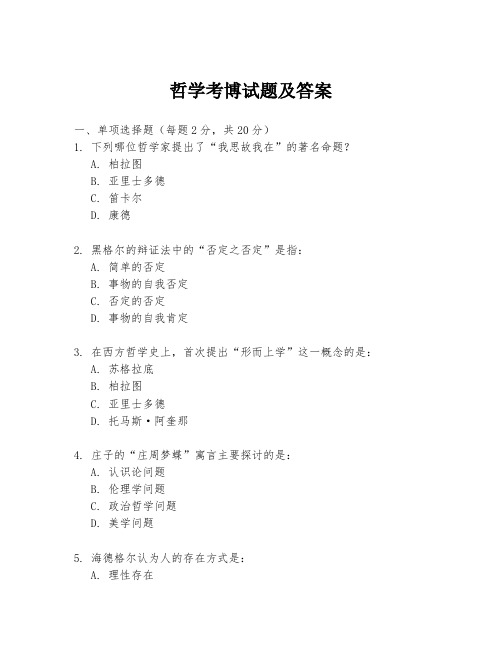
哲学考博试题及答案一、单项选择题(每题2分,共20分)1. 下列哪位哲学家提出了“我思故我在”的著名命题?A. 柏拉图B. 亚里士多德C. 笛卡尔D. 康德2. 黑格尔的辩证法中的“否定之否定”是指:A. 简单的否定B. 事物的自我否定C. 否定的否定D. 事物的自我肯定3. 在西方哲学史上,首次提出“形而上学”这一概念的是:A. 苏格拉底B. 柏拉图C. 亚里士多德D. 托马斯·阿奎那4. 庄子的“庄周梦蝶”寓言主要探讨的是:A. 认识论问题B. 伦理学问题C. 政治哲学问题D. 美学问题5. 海德格尔认为人的存在方式是:A. 理性存在B. 社会存在C. 在世存在D. 抽象存在6. 下列哪位哲学家不是存在主义者?A. 萨特B. 海德格尔C. 尼采D. 洛克7. 康德在《纯粹理性批判》中区分了先验与经验,他认为先验是:A. 后天获得的知识B. 先天的知识C. 通过感官获得的知识D. 通过理性获得的知识8. 马克思主义哲学认为,社会存在决定:A. 社会意识B. 社会制度C. 社会关系D. 社会生产力9. 维特根斯坦在《逻辑哲学论》中提出,哲学的混乱源于:A. 语言的滥用B. 逻辑的混乱C. 思维的混乱D. 知识的缺乏10. 下列哪位哲学家主张“知识即德性”?A. 苏格拉底B. 柏拉图C. 亚里士多德D. 斯宾诺莎二、简答题(每题10分,共30分)11. 简述休谟的因果关系理论。
12. 解释康德的“先验范畴”及其在认识论中的作用。
13. 阐述庄子的“天人合一”思想。
三、论述题(每题25分,共50分)14. 论述尼采的“超人”理念及其对现代哲学的影响。
15. 分析并评价罗尔斯的正义理论,特别是其“正义即公平”的观点。
参考答案:一、单项选择题1. C2. C3. C4. A5. C6. D7. B8. A9. A10. A二、简答题11. 休谟的因果关系理论认为,我们对因果关系的认识并非来自于理性的推导,而是基于习惯和经验的归纳。
清华大学马克思主义理论考研招生人数参考书报录比复试分数线考研真题考研经验招生简章
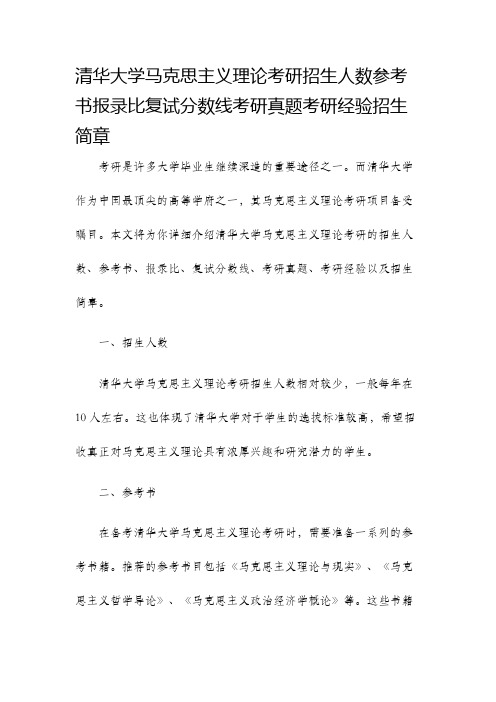
清华大学马克思主义理论考研招生人数参考书报录比复试分数线考研真题考研经验招生简章
考研是许多大学毕业生继续深造的重要途径之一。
而清华大学作为中国最顶尖的高等学府之一,其马克思主义理论考研项目备受瞩目。
本文将为你详细介绍清华大学马克思主义理论考研的招生人数、参考书、报录比、复试分数线、考研真题、考研经验以及招生简章。
一、招生人数
清华大学马克思主义理论考研招生人数相对较少,一般每年在10人左右。
这也体现了清华大学对于学生的选拔标准较高,希望招收真正对马克思主义理论具有浓厚兴趣和研究潜力的学生。
二、参考书
在备考清华大学马克思主义理论考研时,需要准备一系列的参考书籍。
推荐的参考书目包括《马克思主义理论与现实》、《马克思主义哲学导论》、《马克思主义政治经济学概论》等。
这些书籍
涵盖了马克思主义理论的基本内容和发展脉络,是考生备考的重要工具。
三、报录比
由于清华大学马克思主义理论考研招生人数有限,每年竞争激烈,报录比较高。
一般情况下,报录比在10:1左右,即每录取一名学生,报名人数约为10人。
四、复试分数线
清华大学马克思主义理论考研的复试分数线在每年的招生章程中有详细规定。
一般来说,复试分数线相对较高,通常需要在笔试成绩的基础上取得一定的面试成绩,综合排名在前列的学生才有机会被录取。
五、考研真题
为了更好地备考清华大学马克思主义理论考研,考生可以积极参加模拟考试和做题训练。
此外,考生还可以收集往年的考研真题进行练习,熟悉考试形式和题型。
清华大学马克思主义理论考研的。
清华大学社会科学学院考博真题-参考书-分数线-复习方法-育明考博
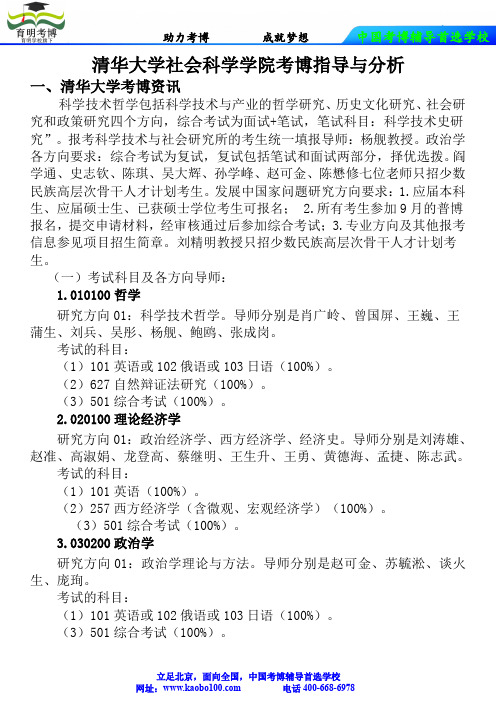
清华大学社会科学学院考博指导与分析一、清华大学考博资讯科学技术哲学包括科学技术与产业的哲学研究、历史文化研究、社会研究和政策研究四个方向,综合考试为面试+笔试,笔试科目:科学技术史研究”。
报考科学技术与社会研究所的考生统一填报导师:杨舰教授。
政治学各方向要求:综合考试为复试,复试包括笔试和面试两部分,择优选拨。
阎学通、史志钦、陈琪、吴大辉、孙学峰、赵可金、陈懋修七位老师只招少数民族高层次骨干人才计划考生。
发展中国家问题研究方向要求:1.应届本科生、应届硕士生、已获硕士学位考生可报名; 2.所有考生参加9月的普博报名,提交申请材料,经审核通过后参加综合考试;3.专业方向及其他报考信息参见项目招生简章。
刘精明教授只招少数民族高层次骨干人才计划考生。
(一)考试科目及各方向导师:1.010100哲学研究方向01:科学技术哲学。
导师分别是肖广岭、曾国屏、王巍、王蒲生、刘兵、吴彤、杨舰、鲍鸥、张成岗。
考试的科目:(1)101英语或102俄语或103日语(100%)。
(2)627自然辩证法研究(100%)。
(3)501综合考试(100%)。
2.020100理论经济学研究方向01:政治经济学、西方经济学、经济史。
导师分别是刘涛雄、赵准、高淑娟、龙登高、蔡继明、王生升、王勇、黄德海、孟捷、陈志武。
考试的科目:(1)101英语(100%)。
(2)257西方经济学(含微观、宏观经济学)(100%)。
(3)501综合考试(100%)。
3.030200政治学研究方向01:政治学理论与方法。
导师分别是赵可金、苏毓淞、谈火生、庞珣。
考试的科目:(1)101英语或102俄语或103日语(100%)。
(3)501综合考试(100%)。
研究方向02:比较政治。
导师分别是张利华、陈琪、史志钦、刘江永、孙哲、张小劲、吴大辉。
研究方向03:国际关系。
导师分别是邢悦、阎学通、李彬、何茂春、孙学峰、陈懋修、赵可金。
研究方向04:中国政府与政治。
清华大学博士入学考试英语真题
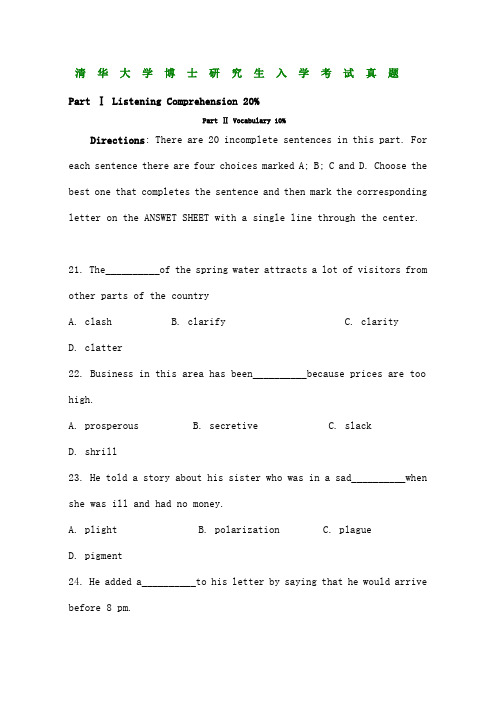
清华大学博士研究生入学考试真题Part Ⅰ Listening Comprehension 20%Part Ⅱ Vocabulary 10%Directions: There are 20 incomplete sentences in this part. For each sentence there are four choices marked A; B; C and D. Choose the best one that completes the sentence and then mark the corresponding letter on the ANSWET SHEET with a single line through the center.21. The__________of the spring water attracts a lot of visitors from other parts of the countryA. clashB. clarifyC. clarityD. clatter22. Business in this area has been__________because prices are too high.A. prosperousB. secretiveC. slackD. shrill23. He told a story about his sister who was in a sad__________when she was ill and had no money.A. plightB. polarizationC. plagueD. pigment24. He added a__________to his letter by saying that he would arrive before 8 pm.A. presidencyB. prestigeC. postscriptD. preliminary25. Some linguists believe that the________age for children learninga foreign language is 5 to 8.A. optimisticB. optionalC. optimalD. oppressed26. It all started in 1950; when people began to build their houses on the__________of their cities.A. paradisesB. omissionsC. orchardsD. outskirts27. The meeting was__________over by the mayor of the city.A. presumedB. proposedC. presentedD. presided28. The crowd__________into the hall and some had to stand outside.A. outgrewB. overthrewC. overpassedD. overflew29. It was clear that the storm__________his arrival by two hours.A. retardedB. retiredC. refrainedD. retreated30. This problem should be discussed first; for it takes__________overall the other issues.A. precedenceB. prosperityC. presumptionD. probability31. Her sadness was obvious; but she believed that her feeling of depression was__________.A. torrentB. transientC. tensileD. textured32. Nobody knew how he came up with this__________idea about the trip.A. wearyB. twilightC. unanimousD. weird33. The flower under the sun would__________quickly without any protection.A. winkB. withholdC. witherD. widower34. The__________of gifted children into accelerated classes will start next week according to their academic performance.A. segregationB. specificationC. spectrumD. subscription35. He__________himself bitterly for his miserable behavior that evening.A. repealedB. resentedC. relayedD. reproached36. Any earthquake that takes place in any area is certainly regarded as a kind of a __________eventA. cholesterolB. charcoalC. catastrophicD. chronic37. He cut the string and held up the two__________to tie the box.A. segmentsB. sedimentsC. seizuresD. secre38. All the music instruments in the orchestra will be__________before it starts.A. civilizedB. chatteredC. chamberedD. chorded39. When the air in a certain space is squeezed to occupy a smaller space; the air is said to be__________.A. commencedB. compressedC. compromisedD. compensated40. She made two copies of this poem and posted them__________to different publishers.A. sensationallyB. simultaneouslyC. strenuouslyD. simplyPart Ⅲ Reading Comprehension 40%Directions: There are 4 reading passages in this part. Each passage is followed by some questions of unfinished statements. For each of them there are four choices marked A; B; C; and D. You should decide on the best choice and then mark the corresponding letter on the Answer Sheet.Questions 41 to 45 are based on the following passage:Each year; millions of people in Bangladesh drink ground water that has been polluted by naturally high levels of arsenic poison. Finding safe drinking water in that country can be a problem. However; International Development Enterprises has a low-cost answer. This non-governmental organization has developed technology to harvest rainwater.People around the world have been harvesting rainwater for centuries. It is a safe; dependable source of drinking water. Unlike ground water; rainwater contains no minerals or salts and is free of chemical treatments. Best of all; it is free.The rainwater harvesting system created by International Development Enterprises uses pipes to collect water from the tops of buildings. The pipes stretch from the tops of buildings to a two-meter tall storage tank made of metal. At the top of the tank is a so-called“first-flush”device made of wire screen. This barrier prevents dirt and leaves in the water from falling inside the tank.A fitted cover sits over the “first-flush” device. It protects the water inside the tank from evaporating. The cover also prevents mosquito insects from laying eggs in the water.Inside the tank is a low coat plastic bag that collects the water. The bag sits inside another plastic bag similar to those used to hold grains. The two bags are supported inside the metal tank. All total; the water storage system can hold up to three-thousand-five-hundred liters of water. International Development Enterprises says the inner bags may need to be replaced every two to three years. However; if the bags are not damaged by sunlight; they could last even longer. International Development Enterprises says the water harvesting system should be built on a raised structure to prevent insects from eating into it at the bottom. The total cost to build this rainwater harvesting system is about forty dollars. However; International Development Enterprises expects the price to drop over time. The group says one tank can provide a family of five with enough rainwater to survive a five-month dry season.41. People in Bangladesh can use__________as a safe source of drinking water.A. ground waterB. rainwaterC. drinking waterD. fresh water42. Which of the following contributes to the low-cost of usingrainwaterA. Rainwater is free of chemical treatments.B. People have been harvesting rainwater for centuries.C. The water harvesting system is built on a platform.D. Rainwater can be collected using pipes.43. Which of the following actually prevents dirt and leaves from falling inside the tankA. a barrierB. a wire screenC. a first-flushD. a storage tank44. The bags used to hold water are likely to be damaged by__________.A. mosquito insectsB. a fitted coverC. a first-flush deviceD. sunlight45. What should be done to prevent insects from eating into the water harvesting system at the bottomA. The two bags holding the water should be put inside the metal tank.B. The inner bags need to be replaced every two years.C. The water harvesting system should be built on a platform.D. A cover should be used to prevent insects from eating it. Questions 46 to 50 are based on the following passage:Where one stage of child development has been left out; or notsufficiently experienced; the child may have to go back and capture the experience of it. A good home makes this possible; for example by providing the opportunity for the child to play with a clockwork car or toy railway train up to any age if he still needs to do so. This principle; in fact; underlies all psychological treatment of children in difficulties with their development; and is the basis of work in child clinics.The beginnings of discipline are in the nursery. Even the youngest baby is taught by gradual stages to wait for food; to sleep and wake at regular intervals and so on. If the child feels the world around him is a warm and friendly one; he slowly accepts its rhythm and accustoms himself to conforming to its demands. Learning to wait for things; particularly for food; is a very important element in upbringing; and is achieved successfully only if too great demands are not made before the child can understand them.Every parent watches eagerly the child's acquisition of each new skill—the first spoken words; the first independent steps; or the beginning of reading and writing. It is often tempting to hurry the child beyond his natural learning rate; but this can set up dangerous feeling of failure and states of anxiety in the child. This might happen at any stage. A baby might be forced to use a toilet too early; a young child might be encouraged to learn to read before he knows the meaningof the words he reads. On the other hand; though; if a child is left alone too much; or without any learning opportunities; he loses his natural zest for life and his desire to find out new things for himself. Learning together is a fruit source of relationship between children and parents. By playing together; parents learn more about their children and children learn more from their parents. Toys and games which both parents and children can share are an important means of achieving this co-operation. Building-block toys; jigsaw puzzles and crossword are good examples.Parents vary greatly in their degree of strictness or indulgence towards their children. Some may be especially strict in money matters; others are severe over times of coming home at night; punctuality for meals or personal cleanliness. In general; the controls imposed represent the needs of the parents and the values of the community as much as the child's own happiness and well-being.46. The principle underlying all treatment of developmental difficulties in children__________.A. is to send them to clinicsB. offers recapture of earlier experiencesC. is in the provision of clockwork toys and trainsD. is to capture them before they are sufficiently experienced47. The child in the nursery__________.A. quickly learns to wait for foodB. doesn't initially sleep and wake at regular intervalsC. always accepts the rhythm of the world around themD. always feels the world around him is warm and friendly48. The encouragement of children to achieve new skills__________.A. can never be taken too farB. should be left to school teachersC. will always assist their developmentD. should be balanced between two extremes49. Jigsaw puzzles are__________.A. too difficult for childrenB. a kind of building-block toyC. not very entertaining for adultsD. suitable exercises for parent-child cooperation50. Parental controls and discipline__________.A. serve a dual purposeB. should be avoided as much as possibleC. reflect the values of the communityD. are designed to promote the child's happinessQuestions 51 to 55 are based on the following passage:More than half of all Jews married in U. S. since 1990 have wed peoplewho aren't Jewish. Nearly 480; 000 American children under the age of ten have one Jewish and one non-Jewish parent. And; if a survey compiled by researchers at the University of California at Los Angeles is any indication; it's almost certain that most of these children will not identify themselves as “Jewish” when they get older.That survey asked college freshmen; who are usually around age 18; about their own and their parents' religious identities. Ninety-three percent of those with two Jewish parents said they thought of themselves as Jewish. But when the father wasn't Jewish; the number dropped to 38 percent; and when the mother wasn't Jew; just 15 percent of the students said they were Jewish; too.“I think what was surprising was just how low the Jewishide ntification was in these mixed marriage families.” Linda Sax is a professor of education at UCLA. She directed the survey which was conducted over the course of more than a decade and wasn't actually about religious identity specifically. But Professor Sax says the answers to questions about religion were particularly striking; and deserve a more detailed study. She says it's obvious that interfaith marriage works against the development of Jewish identity among children; but says it's not clear at this point why that's the case. “This new study is necessary to get more in-depth about their feelings about their religion. That's something that the study that I completedwas not able to do. We didn't have information on how they feel about their religion; whether they have any concern about their issues of identification; how comfortable they feel about their lifelong goals.I think the new study's going to cover some of that;” she says. Jay Rubin is executive director of Hilel; a national organization that works with Jewish college students. Mr. Rubin says Judaism is more than a religion; it's an experience. And with that in mind; Hillel has commissioned a study of Jewish attitudes towards Judaism. Researchers will concentrate primarily on young adults; and those with two Jewish parents; and those with just one; those who see themselves as Jewish and those who do not. Jay Rubin says Hillel will then use this study to formulate a strategy for making Judaism more relevant to the next generation of American Jews.51. The best title of this passage is__________.A. Jewish and Non-Jewish in AmericanB. Jewish Identity in AmericaC. Judaism-a ReligionD. College Jewish Students52. Among the freshmen at UCLA__________thought themselves as Jewish.A. mostB. 93% of those whose parents were both JewishC. 62% of those only whose father were JewishD. 15% of those only whose mother were Jewish53. The phrase “interfaith marriage” in the Paragraph 3 refers to the__________.A. marriage of people based on mutual beliefB. marriage of people for the common faithC. marriage of people of different religious faithsD. marriage of people who have faith in each other54. Which of the following statements is NOT true about professor Sax's researchA. The research indicates that most students with only one Jewish parent will not think themselves as Jewish.B. The survey was carried out among Jewish Freshmen.C. The research survey didn't find out what and how these Jewish students think about their religion.D. The research presents a new perspective for the future study.55. Which of the following is true according to the last paragraphA. Mr. Rubin is the founder of Hillel.B. Mr. Rubin thinks that Judaism is not a religion and it's an experience.C. Hillel is an organization concerned with Jewish college students in the world.D. Hillel has asked certain people to carry out a study about Jewish attitudes towards Judaism.Questions 56 to 60 are based on the following passage: Governments that want their people to prosper in the burgeoning world economy should guarantee two basic rights: the right to private property and the right to enforceable contracts; says Mancur Olson in his book Power and Prosperity. Olson was an economics professor at the University of Maryland until his death in 1998.Some have argued that such rights are merely luxuries that wealthy societies bestow; but Olson turns that argument around and asserts that such rights are essential to creating wealth. “In comes are low in most of the countries of the world; in short; because the people in those countries do not have secure in dividual rights;” he says.Certain simple economic activities; such as food gathering and making handicrafts; rely mostly on individual labor; property is not necessary. But more advanced activities; such as the mass production of goods; require machines and factories and offices. This production is often called capital-intensive; but it is reallyproperty-intensive; Olson observes.“No one would normally engage in capital-intensive production if he or she did not have rights that kept the valuable capital from beingtaken by bandits; whether roving or stationary;”he argues. “There is no private property without government—individuals may have possessions; the way a dog possesses a bone; but there is private property only if the society protects and defends a private right to that possession against other private parties and against the government as well.”Would-be entrepreneurs; no matter how small; also need a government and court system that will make sure people honor their contracts. In fact; the banking systems relied on by developed nations are based on just such an enforceable contract system. “We would not deposit our money in banks...if we could not rely on the bank having to honor its contract with us; and the bank would not be able to make the profits it needs to stay in business if it could not enforce its loan contracts with borrowers;” Olson writes.Other economists have argued that the poor economies of Third World and communist countries are the result of governments setting both prices and the quantities of goods produced rather than letting a free market determine them. Olson agrees there is some merit to this point of view; but he argues that government intervention is not enough to explain the poverty of these countries. Rather; the real problem is lack of individual rights that give people incentive to generate wealth. “If a society has clear and secure individual rights; thereare strong incentives 刺激;动力to produce; invest; and engage in mutually advantageous trade; and therefore at least some economic advance;” Olson concludes.56. Which of the following is true about OlsonA. He was a fiction writer.B. He edited the book Power and Prosperity.C. He taught economics at the University of Maryland.D. He was against the ownership of private property.57. Which of the following represents Olson's point or viewA. Protecting individual property rights encourages wealth building.B. Only in wealthy societies do people have secure individual rights.C. Secure individual rights are brought about by the wealth of the society.D. In some countries; people don't have secure individual rights because they're poor.58. What does Olson think about mass productionA. It's capital intensive.B. It's property intensive.C. It relies on individual labor.D. It relies on individual skills.59. What is the basis for the banking systemA. Contract system that can be enforced.B. People's willingness to deposit money in banks.C. The possibility that the bank can make profits from its borrowers.D. The fact that some people have surplus money while some need loans.60. According to Olson; what is the reason for the poor economies of Third World countriesA. government interventionB. lack of secure individual rightsC. being short of capitalD. lack of a free marketPart Ⅳ Cloze 10%Directions: There are 20 blanks in the following passage. For each blank there are four choices marked A; B; C and D. You should choose the ONE that best fits into the passage. Then mark the corresponding letter on the Answer Sheet.For the people who have never traveled across the Atlantic the voyage is a fantasy. But for the people who cross it frequently one crossing of the Atlantic is very much like another; and they do not make the voyage for the__61__of its interest. Most of us are quite happy whenwe feel__62__to go to bed and pleased when the journey__63__. On the first night this time I felt especially lazy and went tobed__64__earlier than usual. When I__65__my cabin; I wassurprised__66__that I was to have a companion during my trip; which made me feel a little unhappy. I had expected__67__but there was a suitcase__68__mine in the opposite corner. I wondered who he could be and what he would be like. Soon afterwards he came in. He was the sort of man you might meet__69__; except that he was wearing__70__good clothes that I made up my mind that we would not__71__whoever he was and did not say__72__. As I had expected; he did not talk to me either but went to bed immediately.I suppose I slept for several hours because when I woke up it was already the middle of the night. I felt cold but covered__73__as well as I could and tries to go back to sleep. Then I realized that a __74__was coming from the window opposite. I thought perhaps I had forgotten__75__the door; so I got up__76__the door but found it already locked from the inside. The cold air was coming from the window opposite. I crossed the room and__77__the moon shone through it on to the otherbed.__78__there. It took me a minute or two to__79__the door myself.I realized that my companion__80__through the window into the sea.61. A. reason B. motive C. cause62. A. tired enough B. enough tired C. enough tiringD. enough tiring63. A. is achieved B. finish C. is overD. is in the end64. A. quite B. rather C. fairlyD. somehow65. A. arrived in B. reached to C. arrived toD. reached at66. A. for seeing B. that I saw C. at seeingD. to see67. A. being lonely B. to be lonely C. being aloneD. to be alone68. A. like B. as C. similar thanD. the same that69. A. in each place B. for all parts C. somewhereD. anywhere70. A. a so B. so C. such aD. such71. A. treat together well B. pass together wellC. get on well togetherD. go by well72. A. him a single word B. him not one wordC. a single word to himD. not one word to him73. A. up me B. up myself C. up to myselfD. myself up74. A. draft B. voice C. airD. sound75. A. to close B. closing C. to have to closeD. for closing76. A. to shut B. for shutting C. in shuttingD. but shut77. A. while doing like that B. as I did like thatC. as I did soD. at doing so78. A. It was no one B. There was no oneC. It was anyoneD. There was anyone79. A. remind to lock B. remember to lockC. remind lockingD. remember locking80. A. had to jump B. was to have jumpedC. must have jumpedD. could be jumpedPart Ⅴ Writing 20%Directions: In this part; you are asked to write a composition on the title of “Effect of Research Event on My Later Life and Work” with no less than 200 English words. Your composition should be based on the following outline given in Chinese. Put your composition on the ANSWER SHEET.1. 在科研和学习中使我最难忘的一件事情是 ..2. 使我难忘的原因是 ..3. 它对我后来的影响是 ..试题详解Part Ⅰ Listening Comprehension略Part Ⅱ Vocabulary 10%21. C 22. C 23. A 24. C 25. C 26. D 27. D 28. B29. A 30.A31. B 32. D 33. C 34. A 35. D 36. C 37. A 38. D 39. B 40. BPart Ⅲ Reading Comprehension41. B 42. A 43. B 44. D 45. C 46. B 47. B 48. D 49. D 50. A51. B 52. B 53. C 54. B 55. D 56. C 57. A 58. B 59. A 60. BPart Ⅳ Clo ze61. D 62. A 63. C 64. B 65. A 66. D 67. D 68. A69. D 70.D71. C 72. C 73. D 74. A 75. A 76. A 77. C 78. B 79. D 80. CPart Ⅴ Writing参考范文: Effect of Research Event on My Later Life and Work The most unforgettable thing in my research career by now is a course named aspects of translation that was given in the second semester when I was a senior undergraduate student.One of the reasons for which the course has left such a deep impression on me is that it was the first time I learned to look at and study translation from a completely new perspective; the perspective of linguistics. Before taking that course; I though that translation was no more than the mechanic practice of turning texts written in one language into those in another and didn't realize that it had anything to do with linguistics; though; in retrospect; the link ought to be obvious for linguistics is the science that studies language properly. It was very fortunate for me to attend during the same semester the course Introduction to Linguistics; which helped me pave the way for the study of that critical course. Obvious as the link between the two disciplines was; it was still a giant project to actually connect the two and the course proved to be very brain-consuming. However; once the barriers collapsed; the landscape altered and became much moreopen. I could appreciate many beautiful scenes that I had never discovered before.Encouraged by the first attempt at inter-disciplinary study; in my later research and life I always try to bridge what I have learned in different courses and different aspects of life; to fill them into my jigsaw of knowledge about the world and myself and to complete it and perfect myself.。
- 1、下载文档前请自行甄别文档内容的完整性,平台不提供额外的编辑、内容补充、找答案等附加服务。
- 2、"仅部分预览"的文档,不可在线预览部分如存在完整性等问题,可反馈申请退款(可完整预览的文档不适用该条件!)。
- 3、如文档侵犯您的权益,请联系客服反馈,我们会尽快为您处理(人工客服工作时间:9:00-18:30)。
清华大学外国哲学考博真题-参考书-分数线一、专业的设置田薇、王晓朝、王路、黄裕生的外国哲学,是一个考博热门方向,一方面是因为老师们长期从事此领域的教学和科研工作,对此领域很有造诣,另一方面是因为这一个方向本身有研究的学术价值,并且在社会主义现代化建设的关键时期,这个专业的人才正是是社会所需要的,有很好的就业前景。
二、考试的科目哲学:外国哲学:①101英语或103日语或104德语或105法语②292西方哲学史③501综合考试;三、导师介绍田薇,清华大学教授。
主要研究领域为西方哲学和基督教。
主持并完成清华大学985项目“中世纪基督教文明及其现代意义”,作为骨干成员完成北京市哲学社会科学九五规划重点项目“世界文明论研究”等多项科研课题。
出版个人专著舆合著5部,发表论文近60篇,合译学术著作4部。
王晓朝,1953年6月出生,现任清华大学哲学系教授。
主要研究领域为外国哲学与宗教学,主要研究方向为古希腊罗马哲学、早期基督教哲学、基督教文化、现当代宗教哲学、现当代文化哲学、宗教伦理学、中西文化交流史。
王路,1955年生,清华大学人文学院哲学系教授,博士生导师;中国社会科学院研究院教授;中国社会科学院研究系列正高级专业技术资格评审委员会委员;北京大学外国哲学研究所兼职研究员;北京书生研究中心客座研究员。
主要著作:《亚里士多德的逻辑学说》,《佛雷格思想研究》、《走进分析哲学》、《逻辑的观念》,《“是”与“真”——形而上学的基石》等。
主要译著有《弗雷格哲学论著选辑》,《算术基础》,《真之追求》,《理性与智慧》等。
论文《读不懂的"存在"起源——与中译本<逻辑研究>商榷》。
黄裕生,男,1965年11月生,福建省平和县人,哲学博士,现为清华大学人文学院哲学系教授,博士生导师,中华全国外国哲学史学会秘书长。
四、参考书目专业课信息应当包括一下几方面的内容:第一,关于参考书和资料的使用。
这一点考生可以咨询往届的博士学长,也可以和育明教育考博分校(官网可咨询)联系。
参考书是理论知识建立所需的载体,如何从参考书抓取核心书目,从核心书目中遴选出重点章节常考的考点,如何高效的研读参考书、建立参考书框架,如何灵活运用参考书中的知识内容来答题,是考生复习的第一阶段最需完成的任务。
另外,考博资料获取、复习经验可咨询叩叩:柒伍陆壹,伍贰玖,叁伍,专业知识的来源也不能局限于对参考书的研读,整个的备考当中考生还需要阅读大量的paper,读哪一些、怎么去读、读完之后应该怎么做,这些也会直接影响到考生的分数。
第二,专题信息汇总整理。
每一位考生在复习专业课的最后阶段都应当进行专题总结,专题的来源一方面是度历年真题考点的针对性遴选,另一方面是导师研究课题。
最后一方面是专业前沿问题。
每一个专题都应当建立详尽的知识体系,做到专题知识点全覆盖。
第三,专业真题及解析。
专业课的试题都是论述题,答案的开放性比较强。
一般每门专业课都有有三道大题,考试时间各3小时,一般会有十几页答题纸。
考生在专业课复习中仅仅有真题是不够的,还需要配合对真题最权威最正统的解析,两相印证才能够把握导师出题的重点、范围以及更加偏重哪一类的答案。
第四,导师的信息。
导师的著作、研究方向、研究课题、近期发表的论文及研究成果,另外就是为研究生们上课所用的课件笔记和讨论的话题。
这些都有可能成为初复试出题的考察重点。
同时这些信息也是我们选择导师的时候的参照依据,当然选择导师是一个综合性的问题,还应当考虑到导师的研究水平、课题能力、对待学生的态度和福利等等。
第五,时事热点话题分析。
博士生导师在选择博士的时候会一般都会偏重考查考生运用基础理论知识来解决现实热点问题的能力,这一点在初试和复试中都有体现。
近几年的真题中都会有联系实际的热点分析。
所以考生在复习备考时就应单多阅读一些本专业本学科的最新研究方向研究成果,权威的期刊上面“大牛们”都在关心、探讨什么话题,以及一些时事热点问题能不能运用本专业的知识来加以解释解决。
五、清华大学考博英语复习指导清华大学的考博英语满分100分,题型有20题20分的词汇,10分的完形填空,5篇40分的阅读理解,15分的英译汉翻译,15分的作文。
清华大学考博英语的整体难度介于六级和老托福之间,对词汇量有很高的要求,特别注重对形近字、意近词和固定搭配以及语法的考察。
做阅读理解一定要遵守“实事求是”的原则,翻译这一个题型很容易丢分,要想得高分,每一天都要遵循“八步法”练习三个句子。
作文对于考生的英语综合能力要求很高,要做到“厚重、灵动和美观”,复习资料建议使用育明教育考博分校编写的清华大学考博英语一本通。
每年有大批的同学英语单科受限,对于英语基础比较差的考生,建议大家早做准备。
(清华大学考博资料获取、辅导课程可咨询叩叩:756.152.935)育明教育考博分校专注于北京地区高校的考博英语及专业课课程辅导。
根植育明学校深厚的高校资源,整合利用历届育明优秀学员的成功经验与高分资料,为每一位学员构建考研考博成功的基础保障,辅导学员人数及辅导成绩连续多年稳居第一。
针对清华大学各专业的考博开设的辅导课程包括:考博英语课程班、考博专业课课程班、申请制课程班、高端协议班。
历年考博课程班的通过率均超过80%。
六、清华大学考博专业课复习指导以下是育明教育考博课程的授课规划,整个授课规划由本专业博士生和组织设定,结合了考试命题的实际,借鉴了历届育明成功学员的复习计划和成功经验,是育明教育考博课程授课质量的保证和高录取率的基础。
考生们也可以借鉴这一复习规划来指导自己的备考。
第一阶段:框架的构建和重点的掌握深入解构核心参考书,建立知识理论体系框架并对重点知识章节和常见考点进行整合。
理清楚学科发展史,特别是每一个阶段的代表人物,著作,主张,提出的背景和评价。
根据专业课老师讲解借鉴前辈经验最终形成学员的专属笔记。
第二阶段:专题整理和讲解在第一阶段的基础上,由专业课老师带领整理重要常考的学科专题,进行各个知识模块的深化和凝练。
以专题为突破口夯实并灵活运用理论知识。
第三阶段:时事热点和出题人的论著对出题老师的研究重点,最新论文成果和重要的上课的笔记课件进行讲解。
对本专业时政热点话题进行分析,预测有可能出现的题型和考察角度。
第四阶段:历年真题演练和讲解对历年真题进行最深入的剖析:分析真题来源、真题难度、真题的关联性,总结各题型的解题思路、答题方法和技巧。
全面提升学员的答题能力,把前面几个阶段掌握的理论知识转化为分数。
第五阶段:模拟练习及绝密押题就最新的理论前沿和学科热点结合现实的热点进行拔高应用性讲解。
开展高强度模拟考试,教会考生怎么破题,怎么安排结构,怎么突出创新点等答题技巧。
结合最新的内部出题信息和导师信息进行高命中押题。
(清华大学考博资料获取、辅导课程可咨询叩叩:柒伍陆壹,伍贰玖,叁伍)七、清华大学考博特别注意事项1、关于招生时间清华大学每年博士生统考有两次,3月份和9月份。
考博也有多种形式:统考、推免、直博、论文博士生等,其他形式的条件非常苛刻,只有统考是一次分数优先的较量,给与了无数考生读博士的希望。
每年9月份的考试,考试时间是由报考院系通知的;三月份的考试,第一阶段笔试时间是统一安排的,是否有资格参加第二阶段综合考试,视各院系生源情况、考生笔试成绩等由各院系决定,并通知考生。
建筑学院、土木工程系、水利水电工程系、热能工程系、汽车工程系、电机工程与应用电子技术系,电子工程系、自动化系、数学系、地球系统科学研究中心、金融学院、法学院、新闻与传播学院、马克思主义学院、人文学院、社会科学学院、美术学院、核能与新能源技术研究院、教育研究院、医学院临床专业的综合考试将安排在笔试成绩公布后进行,其他院系综合考试在笔试后立即进行。
同等学力考生在初试合格后须加试报考专业两门硕士专业学位课程(具体科目请咨询院系)和自然辩证法。
2、关于招生类别(1)非定向培养博士研究生:脱产学习三年,需将人事档案按教育部规定向存档单位调取档案、户口转到学校,毕业时根据国家就业政策“双向选择”。
育明教育考博分校解析:这类博士生占据清华大学所有被录取的博士研究生中的绝大多数,人事档案和户口转到学校之后,可以享受北京市集体户口的待遇,可以小汽车摇号,可以享受保险,建议大家转档转户口。
(2)定向培养博士研究生:保证脱产学习至少一年,考生工作单位、录取学校、考生本人三方签署定向培养协议,毕业后回原单位工作。
另外,因学校学生宿舍资源紧张,定向就业(不转档案)博士生不安排学生宿舍住宿。
育明教育考博分校解析:此类研究生不是大家所谓的“在职研究生”,在职研究生指的是利用周六日和寒暑假上课的研究生,现在除了极个别学校还招收极少量的在职研究生之外,绝大多数学校都已经取缔了在职研究生。
想保留原职的考生可以选择定向培养博士研究生。
定向培养研究生就医报销等费用按原工作单位的规定执行。
3、关于招考年龄报考非定向培养博士生的考生至入学时未满45周岁(1970年8月31日以后出生);报考定向培养博士生的考生年龄不限。
育明教育考博分校解析:大家要注意报考年龄的限制,博士毕业35周岁以内才有解决户口的资格,要想通过博士研究生解决户口的同学对此要格外注意。
4、关于考试科目(1)第一阶段笔试:①基础外语:英语、德语、日语、法语等,自己选一门或按照报考老师要求选一门。
育明教育考博分校解析:清华大学的考博英语难度介于六级和老托福之间,对词汇量的要求非常高,每一年有相当一批考生因为英语单科不过50分而受限。
考日语和俄语要比考英语有优势,有这两门语言功底的考生,可以选择考博日语或者考博俄语。
②一门专业课(部分招生院系无学校统一组织的专业课笔试)育明教育考博分校解析:对于这一门专业课,大家应该找对参考书目、找好资料、加上合理的规划和到位的辅导,考博成功是没有问题的。
③同等学力考生在初试合格后须加试报考专业两门硕士专业学位课程(具体科目请咨询院系)和自然辩证法。
育明教育考博分校解析:同等学力的考生考博确实有一定的难度,但是每一年都有成功的例子。
只要大家肯努力,把资料准备齐全,然后给自己制定一个合理的规划,再找人给自己做一个到位的辅导,相信考取清华大学的博士并不是不可能的事情。
(2)第二阶段综合考试:笔试(按招生院系的要求是否有笔试)、外语加面试。
是否有资格参加综合考试,视各院系生源情况、考生笔试成绩等由各院系决定,并通知考生。
建筑学院、土木工程系、水利水电工程系、热能工程系、汽车工程系、电机工程与应用电子技术系,电子工程系、自动化系、数学系、地球系统科学研究中心、金融学院、法学院、新闻与传播学院、马克思主义学院、人文学院、社会科学学院、美术学院、核能与新能源技术研究院、教育研究院、医学院临床专业的综合考试将安排在笔试成绩公布后进行,其他院系综合考试在笔试后立即进行。
